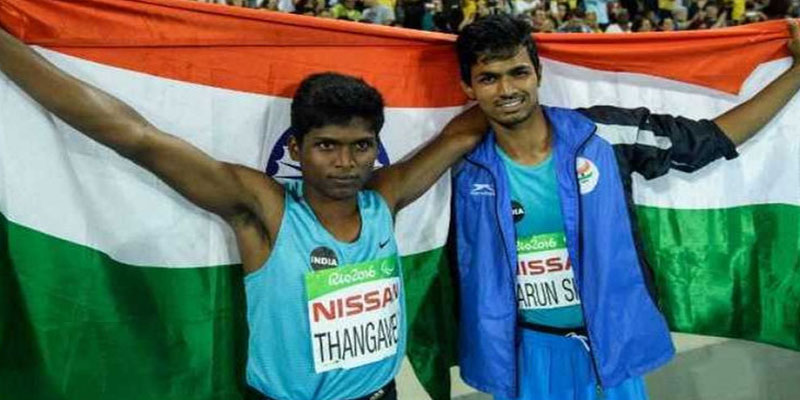Away From the Spotlights India's Paralympians Do Her Proud in Rio

BENGALURU: The 15th edition of the 2016 Summer Paralympics are underway in Rio De Janerio, Brazil, commencing on September 7 and concluding on 18 September. The Indian contingent this year has already won two medals – a gold and bronze in the Men’s High Jump T-42 event.
The Paralympics are a major international sporting event for athletes with disabilities who compete in 25 sports events such as judo, badminton, athletics, archery, boccia, and sailing. The games are governed by the International Paralympics Committee (IPC) which in June 2016 formally recognised the Paralympic Committee of India (PCI) headed by Rao Inderjit Singh as president.
Sports – in general and organised -for persons with disabilities were introduced after the Second World War to assist war veterans and civilians who were disabled as a result of injuries. The first Paralympics were held in 1960 in Rome and have since been held every four years, just like the Summer Olympics. 400 athletes from 32 countries participated in the first edition of the Paralympics.
This year, 4,342 participants from 159 countries across the globe are taking part in the event. The Paralympics are essentially for persons with physical disabilities; however, events for persons with intellectual disabilities are also slowly being included.
The Paralympics are often confused with the Special Olympics. While the both are based on the fundamental principles of the Olympic Charter, the two are different. The Special Olympics were officially recognised by the International Olympic Committee in 1988 and are for athletes with intellectual disabilities; however unlike the Paralympics they are not held in conjunction with the Olympic Games.
They are both based on different philosophies - for the Paralympics, athletes have to meet a certain qualifying criteria in order to compete and the games are geared towards more ‘elite’ competition.
In contrast, the Special Olympics do not exclude athletes based upon qualifying scores; rather athletes are divided based on the scores of others with similar abilities. During the 2015 Special Olympics in Los Angeles, USA the Indian contingent won a total of 173 medals.
The next edition of the Special Olympics will be held in 2019, the city for which is yet to be decided. Germany, Australia and South Africa were chosen out of the several countries that bid for the event; however, all three countries withdrew their bids in 2015, not much information is available as to why.
The 2016 Paralympics too are faced with financial challenges due to desultory interest from the sponsors and poor ticket sales; as a result of which several events have had to be relocated and voluntary staff and transport facilities reduced.
It comes with little surprise that the 2016 Paralympics is facing budget cuts and countries have withdrawn their bid for the 2019 Special Olympics. World over, persons with disabilities face marginalisation and not much money is spent on their welfare and rehabilitation.
Disability sports in India are poorly funded, recognised and promoted. Given the poor understanding of disability issues in the country, lack of infrastructural support, accessibility and political will, the kind of support received by Paralympians in the country is questionable.
Gurusharan Singh, vice president of the PCI, in an interview to NDTV said ‘We know how we performed in the Olympics and now you will see how we perform in Paralympics. We all know the facilities given to Olympians and how many medals they got and we will see how our Paralympians perform."
It is only recently that civil sector organisations have began including sports as a part of their rehabilitation and intervention plans and encouraging individuals with disabilities to pursue sports. A majority of the population is not aware of even the basic difference between the Paralympics and the Special Olympics, nor are they aware of India’s participation and history at these events.
India first participated in the 3rd edition of the Paralympics held at Tel Aviv in 1968, for which a contingent of ten athletes was sent. In 1972, during the 4th edition, Mularikant Petkar became the first Indian to win a gold medal at the Paralympics in swimming.
India participated in the 7th edition of the games during which the country was ranked 37th along with South Korea and won four medals (2 silver and 2 bronze). Apart from the 1976 and 1980 edition of the Paralympics Games, India has been a part of all the games since 1968. In 2004, India was ranked 53 among the 135 countries which participated, winning 2 medals (gold and bronze); in 2012, the country was ranked 67 among the 164 participating nations and won a silver medal.
In the 2016 Paralympics, India has sent its largest ever contingent of 19 athletes – 16 men and 3 women – who will be participating in Archery (women), Athletics (men and women), Power lifting (men), Shooting (men) and Swimming (men). Thusfar, India has finished competing in four competitions - Suyash Narayan in the Men’s 50m freestyle ranked 9th in the final; Farman Basha ranked 4 in the Men’s 49kg Power Lifting event; Anil Kumar finished ranking 7th in the Discus Throw finals; while Naresh Sharma failed to qualify for the Men’s R1 – 10m Air Rifle Standing final.
Unfortunately, even though the Indian contingent has in the past and is expected even in this edition of the games to do well and win a good haul of medals, there is little information made available about schedule of the Indian participants; nor are the Paralympics being broadcast in the country.
(Cover Picture Mariyappan Thangavelu who won the gold medal with Varun Singh Bhati who got the bronze )



